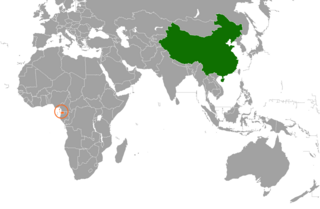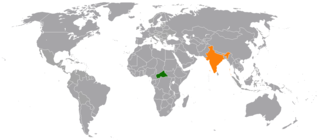The Gwadar Port is situated on the Arabian Sea at Gwadar in Balochistan province of Pakistan and is under the administrative control of the Maritime Secretary of Pakistan and operational control of the China Overseas Port Holding Company. The port features prominently in the China–Pakistan Economic Corridor (CPEC) and is considered to be a link between the Belt and Road Initiative and the Maritime Silk Road projects. It is about 120 kilometres (75 mi) southwest of Turbat, and 170 kilometres (110 mi) to the east of Chabahar Port.

The Hub Power Company Limited, colloquially known as Hubco, is a Pakistani power company based in Karachi, Sindh. It was the first independent power producer (IPP) established in Pakistan, and before the termination of its energy agreement in October 2024, it was the largest IPP in the country. The revenue of the company is United States Dollars denominated.

China–Pakistan relations, also referred to as Chinese-Pakistani relations or Sino–Pakistani relations, refers to the bilateral relations between the Islamic Republic of Pakistan and the People's Republic of China (PRC). Formal relations between China and Pakistan were established in 1950, when the Dominion of Pakistan was among the first countries to sever diplomatic relations with the Republic of China (ROC) government in favour of recognizing the PRC as the legitimate "China". Since then, relations between the two countries have been extremely cordial for more than half a century, which are influenced by their similar geopolitical interests. Both countries have placed considerable importance on the maintenance of a "special relationship" between them, and their regular exchanges of high-level visits have culminated in the establishment of various cooperative measures. China has provided economic, technical, and military assistance to Pakistan; both sides regard each other as close strategic allies.

Chabahar Port is a seaport in Chabahar located in southeastern Iran, on the Gulf of Oman. It serves as Iran's only oceanic port, and consists of two separate ports named Shahid Kalantari and Shahid Beheshti, each of which has five berths. It is only about 170 kilometres west of the Pakistani port of Gwadar.
The Export–Import Bank of China is a policy bank of China under the State Council. Established in 1994, the bank was chartered to implement the state policies in industry, foreign trade, economy, and foreign aid to other developing countries, and provide policy financial support so as to promote the export of Chinese products and services.

Pakistan–South Korea relations refers to bilateral diplomatic relationship between Pakistan and South Korea. Since the 1980s, the relations between the two Asian states have improved and periodically enhanced. Pakistan has an embassy in Seoul, South Korea, and South Korea has an embassy in Islamabad, Pakistan. Pakistan is one of the few countries that have good relations with both North Korea and South Korea.

China–Equatorial Guinea relations refer to the foreign relations between China and Equatorial Guinea. China and Equatorial Guinea established diplomatic relations on October 15, 1970. Following a coup-d’état which brought current president Teodoro Obiang Nguema Mbasogo to power, diplomatic relations were temporarily suspended and resumed again in 1985.

China–Pakistan Economic Corridor is a 3,000 km Chinese infrastructure network project currently under construction in Pakistan. This sea-and-land-based corridor aims to secure and shorten the route for China’s energy imports from the Middle East, avoiding the existing path through the Straits of Malacca between Malaysia and Indonesia, which could be blockaded in case of war, thereby threatening China’s energy-dependent economy. Developing a deep-water port at Gwadar in the Arabian Sea and establishing a robust road and rail network from this port to the Xinjiang region in western China would serve as a shortcut, enhancing trade between Europe and China. In Pakistan, the project aims to address electricity shortages, develop infrastructure, and modernize transportation networks, while also transitioning the economy from an agriculture-based structure to an industrial one.

The Belt and Road Initiative, known in China as the One Belt One Road and sometimes referred to as the New Silk Road, is a global infrastructure development strategy adopted by the Chinese government in 2013 to invest in more than 150 countries and international organizations. The BRI is composed of six urban development land corridors linked by road, rail, energy, and digital infrastructure and the Maritime Silk Road linked by the development of ports.

The 2016 BRICS summit was the eighth annual BRICS summit, an international relations conference attended by the heads of country or heads of government of the five member countries Brazil, Russia, India, China and South Africa. The summit was held from 15 to 16 October 2016 at the Taj Exotica hotel in Benaulim, Goa, India. India holds the chair of the BRICS from February 2016 to December 2016.

The Silk Road Fund is a China Government Guidance Fund to foster increased investment in countries along the Belt and Road Initiative, an economic development initiative primarily covering Eurasia. The Chinese government pledged US$40 billion for the creation of the investment fund, established on 29 December 2014.

The 1,320 megawatt Pakistan Port Qasim Power Project comprises two 660 megawatt supercritical coal power plants, one of which was inaugurated in December 2016 as part of the China–Pakistan Economic Corridor. The $2.09 billion project is located on 330.7 acres at Port Qasim, 37 kilometers east of Karachi in Sindh Province. The project is part of a group of 14 energy projects which fall under the fast-tracked "Early Harvest" program of the $46 billion China Pakistan Economic Corridor project.

Zonergy is a Chinese energy conglomerate engaged in the development of solar and biomass energy and the cultivation of palm oil.

The Engro Thar Coal Power Project (Thar-ll), also known as Engro Powergen Thar, is a coal-fired power plant developed as part of the China–Pakistan Economic Corridor by Sindh Engro Coal Mining Company and China Machinery Engineering Corporation in the Thar Block-II of the Thar Coalfield, Tharparkar District, Sindh, Pakistan 25 kilometers from the town of Islamkot near the village of Singharo-Bitra.

Diplomatic relations between the Republic of Azerbaijan and the People's Republic of China were established on April 2, 1992. The relations between the two countries have developed smoothly and high-level exchanges have been close. The PRC embassy in Baku openly commends Azerbaijan for supporting its stance on the political status of Taiwan, Tibet's sovereignty, the conflict in Xinjiang, and the suppression of Falun Gong. All political forces have actively advocated strengthening friendly cooperation with China. China was one of the first countries to recognize independence.

Central African Republic–India relations refers to the bilateral relations between the Central African Republic (CAR) and India. The Embassy of India in Kinshasa, Democratic Republic of the Congo is concurrently accredited to CAR. India also maintains an Honorary Consulate General in Bangui. CAR has no diplomatic mission in India.

Honduras–India relations refers to the international relations that exist between Honduras and India. The Ambassador of India in Guatemala City is concurrently accredited to Honduras. India also maintains an Honorary Consul General in Tegucigalpa. Honduras is accredited to India from its embassy in Kuwait City.
Green finance is officially promoted as an important feature of the Belt and Road Initiative, China's signature global economic development initiative. The official vision for the BRI calls for an environmentally friendly "Green Belt and Road".
The Shanghai Cooperation Organisation Interbank Consortium is a platform for joint financing of development projects by members and other participants of the Shanghai Cooperation Organisation.
The Gwadar Coal–Power Plant represents a 300-megawatt (MW) coal-fired power facility situated in Gwadar, Balochistan, Pakistan. It is part of the China-Pakistan Economic Corridor (CPEC).















